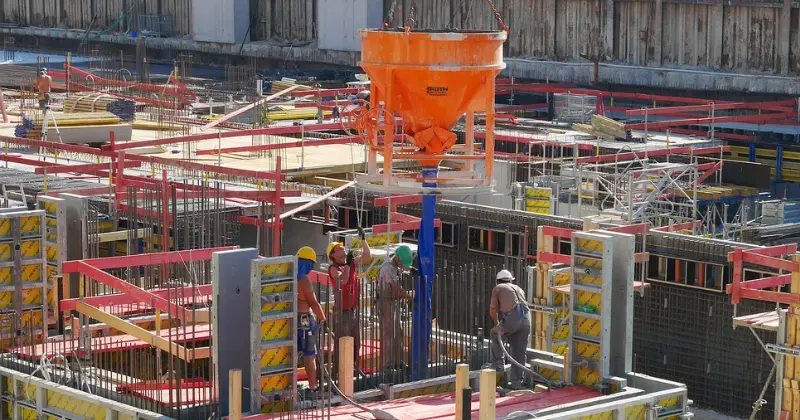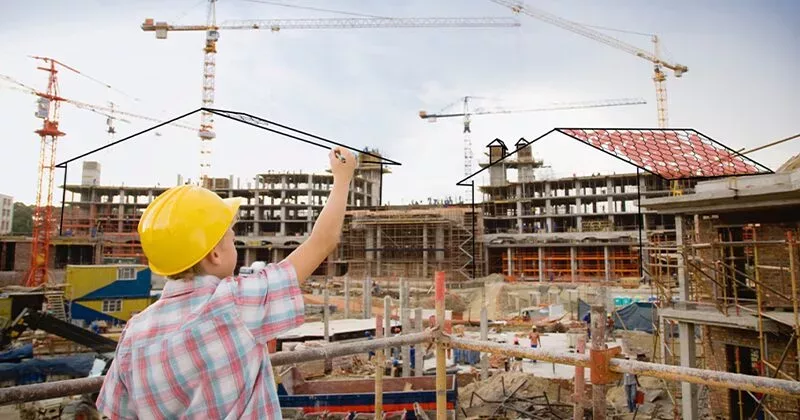11 mins read
What is a HSEQ Manager? Everything You Need to Know About This Important Role

As part of our mission to educate people about the different technologies, processes, and people that comprise the construction industry, we have been putting together a series of blog posts that dive into different construction roles, describing their key skills, responsibilities, challenges, potential salary, and more. We have already explored the roles of the construction project manager, the construction manager, and the quantity surveyor. Today, it is the turn of the HSEQ manager, also known as the QHSE manager.
Safety, quality, and environmental care are some of the most crucial elements of a construction project, and companies invest millions of dollars to turn them into their competitive advantage. This makes the role of an HSEQ manager fundamental in today’s context. This professional has extensive experience in legal regulations, standards, and best practices to ensure projects are completed with the highest quality, safety, and environmental care.
Keep reading to learn everything about the HSEQ manager role!
What is an HSEQ Manager?
A Health, Safety, Environmental, and Quality (HSEQ) manager is responsible for ensuring the health and safety of workers, the highest quality for the construction work, and the least impact on the environment. They do so with the help of tools and industry best practices.
The role of the HSEQ manager has mutated a lot over the years. At first, there was an H&S (health and safety) manager, which mutated into an HSE (health, safety, and environmental) manager, which ended up mutating into HSEQ when the needs of the modern construction world required health, safety, environmental and quality aspects to be managed together.
These professionals are highly experienced and knowledgeable regarding industry best practices and regulatory requirements. They collaborate with other stakeholders, including site managers, engineers, and others, to recognize and mitigate potential construction hazards, implement health and safety strategies, and maintain quality standards across multiple projects, among other responsibilities we explore below.
What does an HSEQ Manager Do?
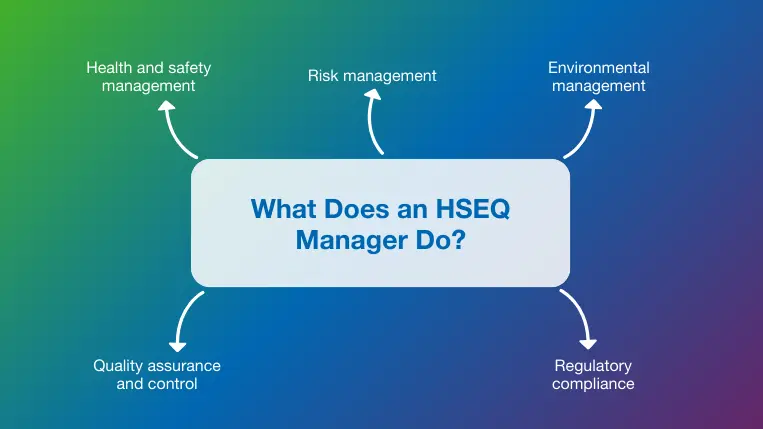
The responsibilities of an HSEQ manager are varied and, at times, complex because of the number of areas they cover. In general, these professionals oversee planning, organizing, and maintaining strategies, processes, and tools that help achieve HSEQ requirements. Let’s explore
Health and safety management
One of the critical responsibilities of this role is to lead and implement health and safety initiatives on the construction site. This includes:
- Advising on the implementation of HSEQ strategies and suggesting new techniques and technologies
- Communicating valuable information to the client and other stakeholders to educate at an organizational level
- Investigating and finding learning opportunities when construction site accidents occur
- Visiting the site regularly to conduct inspections and ensure safety and health requirements are being followed
- Organizing training instances to ensure workers and contractors are educated about safety practices, emergency procedures, and the proper use of personal protective equipment
- Ensuring all documentation related to health and safety is kept up to date.
Risk management
Another key responsibility of this role is ensuring an efficient construction risk management strategy is in place to avoid unexpected issues and to stay compliant with regulations. This involves:
- Ensuring all site personnel have the required permits and are educated on potential risks and how to act if something goes wrong
- Evaluating equipment like scaffoldings and ladders to ensure they are working correctly and safely
- Developing a plan to respond to any potential hazards like weather conditions or a site accident
- Monitoring the worksite continuously throughout the project to spot any instances or risks as the work is completed.
Regulatory compliance
Ensuring regulatory compliance is one of the most essential responsibilities of this role. This involves being up to date with relevant laws, regulations, and standards, not only common ones but also project-specific ones, conducting regular audits and inspections to verify the work is completed within legal parameters, and managing risks that might affect compliance goals.
Environmental management
The “E” in HSEQ manager stands for “environmental,” which means this role is also in charge of a project’s sustainability aspect. This involves overseeing initiatives to minimize the project’s environmental impact by conducting environmental risk analysis, using greener materials, reducing and managing waste, tracking and reducing carbon emissions, and training project stakeholders about awareness and best practices. It also includes staying compliant with environmental regulations and researching innovative ways to ensure the building or structure is also sustainably operated. For all of these initiatives, they support themselves with professional sustainable construction software.
Quality assurance and control
As part of their construction quality manager responsibilities, this role oversees all aspects related to quality assurance and quality control. This requires them to be highly informed about industry regulations and standards, like ISO 9001 and ISO 14001, as well as the client requirements, as this will allow them to put the project in the context of both and develop quality strategies. Amongst the key quality-related tasks are establishing quality standards and informing the rest of the stakeholders about them, conducting regular inspections to ensure the work complies with those standards, and staying informed about any new regulations or requirements from the client, among other things.
Key HESQ Manager Skills
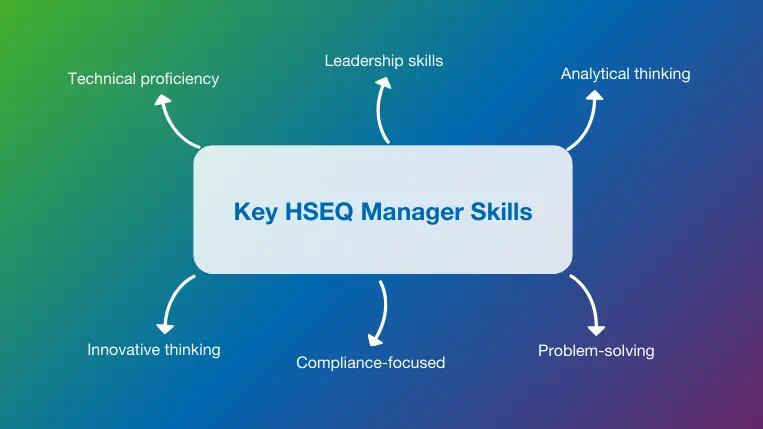
To perform all the aforementioned responsibilities, HSEQ managers must possess a range of skills that mix technical and industry knowledge with soft skills that facilitate collaboration and communication. Let’s explore them below.
- Technical proficiency: Being technology-driven is of the utmost importance for professionals in this role. To ensure HSEQ requirements are met, they must support themselves with different digital construction technologies, including software, drones, sensors, and more.
- Leadership skills: HSEQ managers must have leadership skills to lead all the initiatives mentioned throughout the post and motivate personnel and management to adopt them. After all, the people who compose the project need to be aware of the importance of HSEQ aspects and integrate them into their thinking and operation.
- Analytical thinking: Analytical thinking is another key skill these professionals must possess. During their day-to-day operations, they’ll need to gather and analyze data and use it to optimize different processes and meet the expected goals. Construction business intelligence software is a powerful tool to assist in this matter, providing all the necessary features to manage project information.
- Problem-solving: It is nearly impossible to think a project will go from inception to completion without issues, especially when discussing quality and safety. That is why construction quality managers must possess problem-solving skills to manage these unexpected emergencies or issues and mitigate their impact promptly.
- Compliance-focused: Regulatory compliance is the basis of all HSEQ initiatives, which means compliance-focused skills can be considered one of the most important for this role. This means being aware of all regulations and ensuring they are considered in all decisions.
- Innovation: Having an innovative mind is fundamental for this role, especially when considering sustainability, a relatively new topic that evolves daily. Thinking outside the box to meet HSEQ goals can present a substantial competitive advantage for professionals in this position.
How Much Can You Earn as an HSEQ Manager?
The HSEQ manager salary will vary depending on the applicant’s experience, the company’s size, the scope of work, the country, and many other factors. However, there is an average salary you can use as a reference for what you can expect to earn in this position. To this date, the average salary in the UK is £55,515 ($72,744), and in the USA it is $107,013. These values might be higher or lower depending on the factors mentioned above.
How to Become a HSEQ Manager?
The path to becoming a professional HSEQ officer combines education, certifications, and relevant work experience. It usually starts with a bachelor’s degree in a related field, such as construction management, environmental science, industrial engineering, or occupational health.
That said, unlike other construction roles, you can also become a HSEQ manager with other types of training, such as certifications or apprenticeships. For instance, in the UK, you can do an advanced apprenticeship as a Safety, Health, and Environment Technician, which lasts two years and allows you to become a technical member of the Institute of Occupational Safety and Health (IOSH) and an affiliate member of the Institute of Environmental Management and Assessment (IEMA). Additional HSEQ certification bodies include the International Organization for Standardization (ISO), the British Standards Institution (BSI), and the Chartered Quality Institute (CQI).
In the USA, some notable certifications for this role include the Certified Industrial Hygienist (CIH) from the American Board of Industrial Hygiene and the Certified Safety Professional (CSP) from the Board of Certified Safety Professionals.
Professional experience is also crucial for this role. Many professional HSEQ managers start in junior roles and build up their expertise until reaching a managerial position. Once you’ve accomplished management status, you still need to have a mindset of continuous learning as regulations in this field change and evolve constantly.
What Challenges do HSEQ Managers Face?
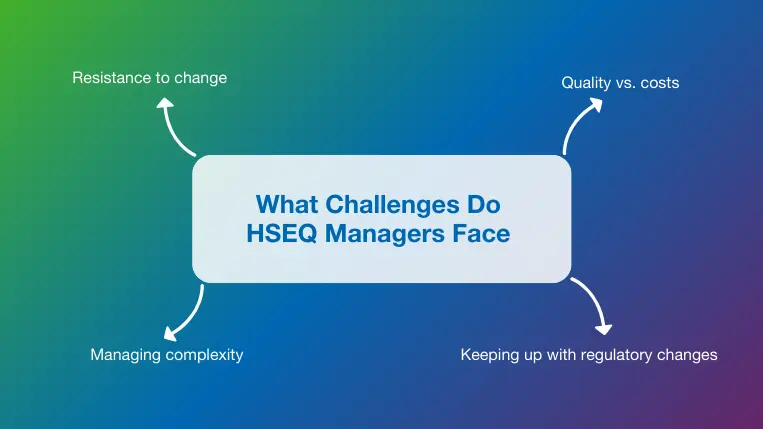
So far, we’ve discussed this role’s key responsibilities and skills and the potential educational path you would need to follow to become one. But that is not all; to truly understand the complexities of this role, it is essential to understand some of the common challenges these professionals face. Let’s explore them in detail below!
- Resistance to change: HSEQ managers entering a company to optimize the current processes can face resistance to change from employees. To avoid this, the best way to succeed is to implement a smart construction change management plan and involve all stakeholders in the process.
- Quality vs. costs: One of the biggest challenges construction quality managers face is balancing quality requirements with budgetary constraints. To tackle this challenge, these professionals must make cost-effective decisions regarding materials, schedules, and tools while considering quality requirements.
- Keeping up with regulatory changes: As mentioned previously, health, safety, and environmental regulations are constantly evolving. This leaves HSEQ managers in a position where they need to monitor their strategies continuously and update them according to the latest regulatory updates. This can become challenging as it takes time, effort, and money to make changes, especially for companies operating in multiple jurisdictions.
- Managing complexity: Due to the complexity of the work, health and safety management can be challenging in construction. HSEQ managers must be properly trained to comprehend and identify common risks and tackle them appropriately.
What Kind of Software Do Construction Quality Managers Use?
To tackle the challenges mentioned above and to optimize several processes to stand out from competitors, HSEQ managers support themselves with various tools and technologies. The most common ones include:
Document Management Software
Like any other construction professional, HSEQ managers must collaborate and communicate critical information to different stakeholders. This involves generating several documents that need to be constantly reviewed and updated as the project progresses. That is where professional construction document management software does its job best.
A great example of such a solution is RIB CX, our web-based construction management software designed to facilitate communication and decision-making in construction projects.
The platform offers a centralized location that allows teams to store and share all relevant information, including documents, drawings, contracts, and reports. This information can be updated in real-time to avoid miscommunications and reworks.
Quality Management Software
As its name suggests, this software is a powerful tool for managing all quality assurance and quality control processes in construction projects. It facilitates risk management, inspections, change orders, and more to ensure quality requirements are met with stakeholder collaboration and communication at the center.
RIB Connex is one tool that can help with quality assurance due to a range of powerful functionalities that automate and enhance quality management.
Among its many features, the platform allows users to create customized test plans, check tasks and checklists from a mobile device on-site and record any issues in real-time and record all quality-related documentation in a centralized location, among other valuable features.
BIM Software
BIM management software is a highly valuable tool for HSEQ professionals. It provides a detailed and interactive 3D model of the project that helps make smarter decisions regarding risk identification, safety and quality compliance, and sustainability. BIM technology also allows users to perform simulations and analyze energy consumption, material usage, and waste generation to ensure quality and environmental requirements are met.
RIB CostX Carbon, our carbon accounting software, supports a wide range of BIM files, allowing you to centralize all project data and make smart decisions about all HSEQ aspects.
Paired with that, our solution includes a carbon calculator that will enable users to estimate carbon emissions from the early stages of the project and compare them to as-built totals to extract valuable conclusions.
Final Thoughts
As you learned throughout this insightful blog post, HSEQ managers are fundamental to successfully completing a construction project. As health, safety, quality, and environmental aspects become increasingly important, so will the need for these experienced professionals. However, those who want to stand out and bring a competitive advantage to their companies must support themselves with professional technologies.
At RIB Software, we are a leading software provider with decades of experience delivering solutions tailored to the needs of construction professionals. If you are interested in experiencing the power of innovative construction software solutions, get a free demo of RIB’s toolkit today!
Most Recent
11 mins read
10 mins read
10 mins read
29 mins read
Blog Categories

Ebook



